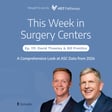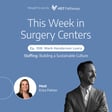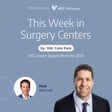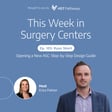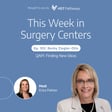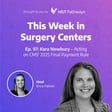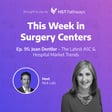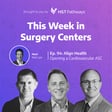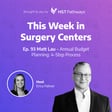Introduction to ASC Industry Podcast
00:00:01
Speaker
Welcome to This Week in Surgery Centers. If you're in the ASC industry, then you're in the right place. Every week, we'll start the episode off by sharing an interesting conversation we had with our featured guest, and then we'll close the episode by recapping the latest news impacting surgery centers. We're excited to share with you what we have, so let's get started and see what the industry's been up to.
CMS 2024 Final Payment Rule Discussion
00:00:27
Speaker
Hi, everyone. Here's what you can expect on today's episode. Karen Newberry is the director of government affairs and regulatory counsel at ASCA. And I had the chance to chat with her about CMS's recently released 2024 final payment rule. We covered reimbursement rates, updates to the ASC covered procedures list, quality reporting changes, OAS caps, and a few other very important details that all ASCs should be aware of.
2023 ASC Industry News Recap
00:00:57
Speaker
In our news recap, we'll cover five moves that shook up the ASC industry in 2023, the debate over the root cause of current staffing issues, the data revolution taking place for ASCs, and of course, end the new segment with a positive story about a college student who found a kidney donor through TikTok. Hope everyone enjoys the episode and here's what's going on this week in Surgery Centers.
Cara Newberry on Regulatory Affairs
00:01:29
Speaker
Hi Cara, welcome back to the podcast. Thanks for having me. So I'm sure all of our listeners are familiar with you, but can you please share a little bit about yourself? Sure. Cara Newberry, I work for the Ambulatory Surgery Center Association. I've been with ASCA now for more than 12 years and I handle regulatory affairs for the association and serve as director of government affairs.
00:01:56
Speaker
Great. So we really wanted to have you on because as everyone knows, CMS officially published their 2024 final payment rule last month.
Medicare Reimbursement Rate Increase 2024
00:02:05
Speaker
And we wanted to make sure that our listeners understood exactly what it contains and what their next steps might be. So to start, could you give us a quick overview of the increases to the Medicare reimbursement rates for 2024? Absolutely. And I want to first highlight the fact that our update
00:02:26
Speaker
is the same as the hospital outpatient department update. And that is because for as long as I've been with ASCA, we've been pushing for better alignment with the hospital outpatient departments update, which is the hospital market basket, because our payment system is tied to the hospital outpatient department. So it makes sense. So our effective update is approximately 3.1% across all procedures, which like I said, is the same as
00:02:54
Speaker
hospital outpatient departments. It will vary by specialty and by code. So make sure that you are looking at
00:03:03
Speaker
specific procedures, if you have questions. I do want to note that we do a quick analysis of how it impacts the top hundred codes by volume in the ASC setting, the top 10 codes.
ASC Code Updates and Increases
00:03:15
Speaker
And although it's a 3.1% overall, for the top hundred codes, we're seeing it's approximately a 6.68% update for those and a 7.22% update for our top 10 codes. And of course our top 10 codes are some ophthalmic codes, including cataracts,
00:03:33
Speaker
a few GI codes and pain management codes. So for the highest codes by volume in the ASC setting, we're seeing a better update than the average across all codes, which I think is a positive sign. That's awesome. Is that a record high? Or I don't remember ever seeing those numbers. Yeah. So I'd have to go back and check, but for the top 10 and
New Procedures Added to ASC List
00:04:00
Speaker
top 100 codes, it is
00:04:02
Speaker
definitely much higher than we normally see. We're seeing like cataract 6694 is almost a 7% increase over 2023. Some of the standard colonoscopy screening codes are 7.9%, 8.74%. So
00:04:23
Speaker
much, much higher than, like I said, that 3% update overall. So that's a positive sign, especially as a lot of our physicians are dealing with the cuts, of course, that are coming under the physician fee schedule. So it's important that we're seeing that growth and that increase with a lot of our higher volume codes on the facility side. Yeah, that's awesome.
00:04:47
Speaker
So when it comes to the ASC covered procedures list, I feel like we're typically used to being a little disappointed in this arena, but this year feels different. So let's talk about the changes to the list, what has been added.
00:05:03
Speaker
Sure, absolutely. And we were very disappointed with the proposed rule, even though it had a few dozen codes, they were all dental and with a lot of restrictions attached. So there was a dental procedure, but you had to do other ancillary codes in conjunction with it in order to get paid. And we're still sorting out some of
00:05:24
Speaker
the dental code side of things because those procedures were finalized in the final rule. But in the proposed rule, there were no other codes proposed outside of the dental, even though ASCA had submitted a list of 63 procedures that we would like to see added, including total shoulder, total ankle, and other procedures that were requested by our membership. And so we were obviously very pleasantly surprised to see that total shoulder.
00:05:53
Speaker
total ankle, a thyroid procedure that we have been promoting.
00:05:57
Speaker
and several others were included in the final rule.
Impact of New ASC Procedures
00:06:01
Speaker
So there were 11 surgical procedures that were not included in the proposed rule that were finalized that will be payable in the ASC setting beginning January 1, 2024, which is fantastic. And it's really most fantastic, obviously, for the Medicare beneficiaries who now have access to the site of service and the care and the efficiency and the quality of care that ASCs provide.
00:06:26
Speaker
We were very excited to see that and looking forward to hopefully maybe this has turned over a new leaf and moving forward, CMS is going to listen to us more closely and be more inclined to add procedures that ASCA and our clinicians are telling them are safe to be performed on the Medicare population.
00:06:47
Speaker
Yeah, actually the HSC marketing team was together in person when the final rule came out and we all stopped to read it and we were blown away. We were guessing like maybe one or two, throw us a bone. And then all just to see the list and especially have total shoulders and total ankle on there was super, super exciting. With the expansion of those codes specifically,
00:07:13
Speaker
What do you think the future now could potentially hold with these additions and look like? Sure. So we were actually nervously promoting the addition of those codes because we were concerned that the rate might be just way too low for
00:07:33
Speaker
ASEs to be able to perform those procedures. But fortunately, another big positive in this role was that total shoulder and total ankle were moved to a higher APC group, meaning that they were bumped up to a costlier, more complex
00:07:51
Speaker
It could be one or the other or both, bumping it up an ortho ambulatory payment classification group, meaning ultimately that the reimbursement is better for hospital outpatient environments. And now it's going to be better for ASCs than it would have been under the 2023 payment classifications and where it currently stands in 2023.
00:08:13
Speaker
So what we're looking at for 2024 at the national level is approximately like a $14,000 reimbursement rate for shoulder, a little higher for ankle, which of course is significantly higher than what we see for like knee and hip. For example, other total joint replacement procedures. And we do know that the implant costs, the device costs for shoulder and ankle are more significant. So it was critical. It was very important to get that higher.
00:08:44
Speaker
Our facilities would obviously still love to see a higher reimbursement rate and we can certainly work on that in the future, but we have been hearing from facilities that hopefully this should allow them if they're going back and maybe negotiating with some of the device manufacturers, but should hopefully allow them to do some fee-for-service Medicare volume for shoulders and ankles in 2024.
00:09:10
Speaker
Yeah, it's really exciting. We had just crunched some numbers on our end for a state of the industry report and we did average net revenue per case. This was not just total joints, just ortho in general, but it was obviously the highest specialty for reimbursement. When we saw this, I was like,
00:09:29
Speaker
But obviously we're always talking about cost savings and all these low reimbursement rates. Like this could be really exciting for not only profitability, but the patients and just increasing physician interest in the outpatient space as well. So very cool to see.
00:09:47
Speaker
Yeah, in addition to getting several emails that night from folks who are in disbelief, they're like, now what does this really mean? Because I think I've trained people over the years to know that just because something's payable in the hospital outpatient departments doesn't mean it's payable in ASCs.
00:10:02
Speaker
And it often takes a long time to get procedures moved to the AC cover procedure list. And if it's not proposed, it's typically not put in the final rule. So I think people are like, is this real? Is this true? And I said, yes. And then some of the follow-up was a surgeon emailing their administrator saying,
00:10:19
Speaker
hey, now I'm going to be able to do a full day. Mondays or what have you, Tuesdays can be dedicated to total shoulder in the ASC, which should help make the surgeons happier, the facility happier. I think one of the questions now we're looking at is making sure that the surgeons have the operating room time to do these procedures, but I guess that's a better problem to have than not being allowed to do them and having to take all of those cases to the hospital setting, which of course
00:10:48
Speaker
is great and needed in certain circumstances. But if at all possible, we think that people should be given the opportunity for the more convenient, often less expensive side of service that ASCs provide. Yep. I totally agree.
Quality Reporting Measures Update
00:11:04
Speaker
All right. Switching gears a little bit. Let's talk about the quality reporting updates. What's going on there? What do we need to know for 2024?
00:11:14
Speaker
Sure. And I might just touch upon something that we'd like folks to know for 2024 that wasn't in the rule first. So just a reminder that OSCAPs.
00:11:26
Speaker
which is the patient experience survey, is going into effect for hospital outpatient departments in 2024. I think there were some thinking that some people were hoping that it might be delayed again. We've been trying to tell people it's not going to be delayed, but so it's going full effect for hospital outpatient departments in 2024. So we really would like ASCs to start at least
00:11:50
Speaker
Looking at vendors, the first and second quarters of the year, so that they are geared up and ready to go for 2025 when it becomes mandatory for ASCs because there's no indication it's aid anymore.
00:12:01
Speaker
going into effect for ASEs in 2025. And we just know from previous experience with other ASEs who've already started with the survey that it can take time to get up and running. And so that's my just quick plug that if you have not already started looking at vendors or the OSCAP survey, which will be part of the ASE Quality Reporting Program requirements in 2025, please do start doing that.
00:12:25
Speaker
So quick plug for that. And then in terms of the final rule, it was a mixed bag, but ultimately we'll say it was positive for ASCs. So CMS had proposed to add back in a volume measure, ASC7, with some modifications to how it was run previously when it was in our quality reporting program.
00:12:46
Speaker
PASCA just had some concerns and questions about why this particular measure, how is it really benefiting the patient. While there are a couple of studies that show that higher volume can of course indicate positive performance because the surgeons and the staff and everyone is doing these on a regular basis and they're efficient.
00:13:05
Speaker
There's really not a lot of data or evidence saying that if you're not doing quite as high a volume that you're unsafe and we're fearful that's where kind of CMS was looking to maybe take that measure or what they were thinking and so CMS is going to continue to evaluate that measure and look for more data and information and we're going to be happy to help them with that but we were happy to see that
00:13:30
Speaker
The measure was not finalized for now while we all talk through and work through what might make that measure better if it's going to be implemented. And then there was another measure, a new measure that was finalized for addition to the ASC quality reporting program. But we were given a one year delay from when it was supposed to be implemented. And that is a patient reported outcome performance measure for total knee and total hip arthroplasty.
00:13:59
Speaker
And it is quite a measure. It is quite going to be time consuming for our facilities. It's going to require a pre-op survey, a post-op survey, a mental health survey in there, all sorts of information. Yeah. And the post-op is up to 400 days post-operatively. So it's not necessarily common as right now for ASEs to still be in touch with their patients 400 days after the procedure.
00:14:26
Speaker
So we're trying to work through that with CMS part of the reason that we were able to get the one year delay on that. So now it won't be required for the ASCs until 2028.
00:14:40
Speaker
reporting period, but we were able to get that delayed because initially CMS wanted to make it voluntary beginning with 2025. And we said, that's the first year that OSCAPs is required. So you're going to require these facilities that are just operationalizing this new burdensome measure and adding another one to their plate. So CMS listened to that to a certain extent and pushed back the voluntary period to 2627.
00:15:07
Speaker
which ultimately pushed back the mandatory reporting to 2028. I do just want to also note this measure has not been tested in the ASC setting. And typically that's something that CMS would like to see before they're adding a measure. So we were a little surprised about that. And on the inpatient side.
00:15:26
Speaker
A similar measure has just started, has just gone into effect as a mandatory element of their quality reporting program. So I think we're interested to see how that data comes out and what the response rates look like for the hospitals, the inpatient hospitals, and that will help direct our advocacy as we're working to make that measure less burdensome for ASCs.
00:15:52
Speaker
Yeah, I was reading through that one and the 400 day thing definitely caught my eye. I don't want to give anybody any ideas, but if they're doing this for total hip and total knee, do you anticipate total shoulder and total ankle coming at some point as well?
00:16:09
Speaker
So, it was interesting because we actually used the proposal of this quality measure to highlight how ridiculous it is that shoulder and ankle aren't even allowed in the ASC setting. We're like, obviously, total joints are being done on fee for service Medicare in such a high volume that you've added a quality measure specific to those procedures. You're not even letting us do shoulder and ankle. So, I think that
00:16:37
Speaker
If it does happen, it would take some time because, like I said, this measure has come down to us through the inpatient.
00:16:47
Speaker
program. And so it would probably be required to be added there first and they might test it on the inpatient basis and then maybe added to the AC in the future. Who knows? I will say obviously knee and hip have more volume than even shoulder and certainly more volume than ankle. So in 2021, which was the first year that we had
00:17:12
Speaker
We saw already 9,000 fee-for-service total hips and approximately 20,000, actually more than 20,000 total knees done in 2021 on fee-for-service Medicare. So I don't think we're going to reach that kind of volume with shoulder and definitely not with ankle, but it could be something they pursue in the future. I will say that overall, CMS is very interested in specialty-specific measure sets.
00:17:40
Speaker
And so they are certainly looking closer at an orthopedic group of measures, an ophthalmic group of measures, GI, et cetera, which has its pluses and minuses. And like I said, we will continue to work with CMS quality reporting staff on that. We do have a monthly call with the quality reporting program staff, which allows us throughout the year to really raise any concerns that we have. So we're not just coming to them in our comment letter.
00:18:10
Speaker
I hate to say complaining, but more often than not raising concerns rather than saying good job, but it does allow us to work with them throughout the year, which is great. Yeah. That's really nice. Build that relationship. Keep outpatient at the forefront.
00:18:26
Speaker
I feel like they, anyone working for CMS has to be used to complaints, unfortunately, but, um, yeah. And we don't yell or we try to keep our, our criticism productive and making sure that we, that everybody in the meeting knows that we're all on the same page. We all want high quality care for Medicare beneficiaries and we're trying to save the Medicare program money. Let us help you with this. Yes.
00:18:54
Speaker
Perfect. So is there anything else that our listeners should be made aware of for next year or keep a close eye on?
New Portal for ASC Procedure Proposals
00:19:03
Speaker
Sure. So there was a new portal that's being established. It will be live in January where interested stakeholders can propose procedures to be added to the ASC cover procedure list. And the window is small. So I just want to note that you do have to submit codes for consideration by March 1st.
00:19:23
Speaker
of 2024 for consideration in 2025. So, ASCA is already starting to compile our list and what we'd like to see added, but if there are any procedures that out there would want us to consider, please feel free to pass those along to us and ASCA will be coming out with more information in the coming weeks and months as to how individual facilities or other stakeholders can submit their own codes for consideration.
00:19:47
Speaker
So that's one thing and I think ultimately that's a positive. It's positive to have a more public facing, a more
00:19:54
Speaker
transparent process because, like I said, although we're happy that we got shoulder and ankle and other procedures added, we're in the dark, right? We go and we have these meetings and we advocate for it, but you never really know what's coming until it's actually finalized. So that's one important thing with regards to rulemaking. But if you don't mind, I might hit on just a couple of things that we're seeing in Congress that I just want people to keep an eye on. Great.
Legislation and Regulatory Updates
00:20:20
Speaker
With our legislation, the Outpatient Surgery Quality and Access Act of 2023, there is a copay cap provision in there that we're really trying to promote and push out because we were talking about like the reimbursement rates for shoulder, for example, approximately 14,000. So when you look at there is a copay cap on what a beneficiary would pay in a hospital setting, including a hospital outpatient department,
00:20:45
Speaker
And it's currently at $1,600. So if you look at the 14,000, you take 20% of that, you can see that if a fee-for-service Medicare beneficiary, if they only have original Medicare, they would be paying more to have their procedure done in the ASC than a hospital outpatient department, which makes no sense. So we're trying to fix that and make sure that there are no cost barriers to the beneficiary to have a procedure done in the ASC. So that's part of our legislation.
00:21:16
Speaker
There's also, for my first time at Ask, and I've been here, like I said, over 12 years, a couple of...
00:21:22
Speaker
legitimate threats that we're facing in terms of like site neutral payments. And we could have a whole podcast on that at some point, I'm sure, but there are certain proposals being floated that could potentially, you know, negatively impact ASCs. And so we want to make sure that we're advocating for the interest of the ASC setting, which of course is already the lower cost compared to hospital outpatient departments and making sure that there's nothing that is enacted that would
00:21:52
Speaker
further reduce our reimbursement rates. And just another thing to keep on the lookout for, and we'll make sure to put out more information from ASCA as this piece of legislation moves, but we did work over the summer. There is a price transparency bill.
00:22:07
Speaker
That is very similar to what has been required of hospitals and there's an interest to include in that. And so there's been legislation that would require some federal price transparency requirements for. So, like I said, it was much more active on the Hill regarding.
00:22:26
Speaker
ASCs than we've been used to in the past and we'll keep folks updated on that. But please do pay attention to like information we're putting out. I'm sure if things get enacted, you all will help put out some information as well. And it should be an interesting and exciting 2024.
00:22:46
Speaker
Absolutely. So if people want more info from ASCA on the payment rule or these other items you mentioned, what resources can they look for? Where should they go?
00:22:58
Speaker
Yeah, and we have recently updated website. So if you haven't already, make sure that you take a look at the ASCA website and there is an entire section on there for payment resources. We have our legislation on there for ASCA members. Of course they can get government affairs updates, et cetera. But yeah, it's association.org.
00:23:20
Speaker
is where you can go for more information and everybody can feel free to reach out to me as well if they have questions or are looking for more information. Perfect. So I will include Ask His Website link in our episode notes as well so people can easily find it. And on behalf of everyone, thank you, Kara. You guys really do an amazing job for the industry and I know how hard you advocate for us.
00:23:45
Speaker
Congrats on all the wins in this year's payment rule. And thanks for coming on. We appreciate it. Yeah, thanks for having me. As always, it has been a busy week in healthcare. So let's jump right in.
Major ASC Industry Changes in 2023
00:24:03
Speaker
Becker's ASC put together a roundup highlighting five moves that shook the ASC industry in 2023. The first move we have been talking about a lot lately, which is that CMS finalized a 3.1% payment rate for ASCs and added 11 procedures to the ASC covered procedures list that were not included in the proposed rule, including total shoulder.
00:24:28
Speaker
CMS also finalized its plans to extend the five-year interim period of using the same pay update factor for ASCs as they do for HOPDs through 2025. That's huge, and hopefully they will continue that on even further.
00:24:46
Speaker
The second move comes from the Department of Health and Human Services Office of the Inspector General. Physician employees of a physician practice, which operates two ASCs, would receive 30% of the net profits from the ASC facility fee, which would violate anti-kickback laws.
00:25:07
Speaker
The Office of the Inspector General, however, ruled that although they did violate anti-kickback laws, it would be protected under the statutory exception and regulatory safe harbor for employees given that the physician recipients would need to be employees of the practice. So that is a first.
AMSURGE and Envision Health Separation
00:25:28
Speaker
Next, just this past October, AMSURGE separated from Envision Health, its former parent company, which filed for bankruptcy earlier this year. It has since emerged under new ownership as a separate and independent entity from Envision. And as a result, AMSURGE's current president, Jeff Snodgrass, will serve as president and CEO.
00:25:53
Speaker
The fourth move comes from Optum, who doubled down on its acquisitions of physician groups with a $3.3 billion purchase of home and hospice care provider, Ameticis. This deal, however, is facing scrutiny from the Justice Department, which requested additional information about the proposed merger this past August.
00:26:16
Speaker
And lastly, while hospitals are facing certificate of need obstacles to build in many markets, some ASCs are finding it easier to receive clearance. We've talked about South Carolina a ton, but there's a health system down there that began construction this fall on a $15.3 million ASC, despite four proposed hospitals being held up by certificate of need laws.
00:26:40
Speaker
And South Carolina's Certificate of Need program is set to inspire in 2027 anyway, which would free up the regulatory process for many new facilities.
Year-End Industry Reflections
00:26:49
Speaker
So per usual, there's a lot going on in the industry. And as we're reaching the end of the year, more and more of these roundups and lists will be coming out. So I will be sure to share them.
00:27:01
Speaker
In our next story, Healthcare Dive is asking the question I think everyone has been wondering for a while now.
Staffing Issues: Shortage or Poor Conditions?
00:27:09
Speaker
Where are all the nurses? Hospitals and nursing unions disagree about what's driving low application rates for open registered nurse positions. I think both of these angles are really interesting and also goes to show why finding resolutions for all the nursing strikes that are going on has been extra difficult.
00:27:31
Speaker
So hospitals label it a nursing shortage and say that they are doing their best to hire, but that there simply aren't enough accredited nurses available.
00:27:42
Speaker
Now, nursing unions and advocates call it a safe staffing failure and reject the idea that the staffing crisis is new. They claim the term nursing shortage lets hospitals off the hook for their role in creating the issue. And they say that any current shortage of nurses is the result of hospitals' own decisions coming back to haunt them.
00:28:07
Speaker
Margaret Franks is the regional director for the New York Nurses Association, and she shared, it has been proven that it is not a nursing shortage. It is just a shortage of nurses willing to work in the conditions that are present at the bedside right now. So others are turning to data to help identify the root cause, but even the numbers a lot of these agencies have shared don't quite paint a consistent or clear picture either way.
00:28:37
Speaker
The number of candidates passing the nurse licensure exam grows each year, according to the National Nursing Licensing Agency, which would align with what the nursing unions are saying. But ZipRecruiter shared that while there are more job postings for nurse positions in 2023 compared to 2020, applications for those positions have fallen 11%, which would align with what the hospitals are saying.
00:29:05
Speaker
And then on a final note, nurses who recently quit told consulting firm McKinsey that they left because they felt undervalued. They were inadequately compensated and were unable to manage increasingly intense workloads. And from what I can tell, hospitals seem to be addressing the compensation piece, but they're not addressing the fact that nurses feel undervalued or that their workloads were unmanageable.
00:29:32
Speaker
and they shared that workers are changing. They care more about work-life balance and the quality of their lives and realizing that they have power to say no to situations that they just don't want to be in. So I don't always have an ulterior motive with these stories, but this seems like the perfect sentiment
00:29:53
Speaker
that ASCs can tap into when creating their job descriptions and recruiting. So if you haven't already, try leaning into the emotions and the story of what a nurse's life looks like at an ASC, predictable hours, more family time, you know exactly when you're going to clock out in those types of benefits. And doing so just might help increase the number of applications that you're seeing.
00:30:20
Speaker
Our third story comes from Outpatient Surgery Magazine.
Data Analytics in ASCs
00:30:24
Speaker
The trend to watch right now is the data revolution. They asked the question, if your ASC generates and collects an enormous amount of data every day, how are you putting it to work to help you improve?
00:30:39
Speaker
because ASCs that are putting their data to work for them and that are embracing big data analytics are the ones who are boosting efficiency, improving outcomes, and gaining that competitive edge.
00:30:51
Speaker
Justin Mooneyhan helps lead technology modernization, enablement and innovation across AMSurg and it's 250 plus ASCs. He shared a lot of great insights into the article about how AMSurg uses data and how other ASCs can too. And I just want to stress that you don't need to be part of a management company or work for a management company or even be a large ASC to be able to collect, aggregate and leverage the power of data.
00:31:21
Speaker
It doesn't matter if you see 100 patients or 800 patients a month, data should still be at the core of your strategy. So right now, AMSUR just focusing on the billing side of the house. And according to Justin, this is because you need a solid billing system and good processes in place from a revenue cycle management perspective to get analytics and drive meaningful insights.
00:31:45
Speaker
You can look at your claims and denials to improve your denial management function, which helps your accounts receivable and cash position. If you have better analytics to know which claims are getting denied, you're probably going to put some effort in to try to close that gap so you don't have as many denials, which of course means less administrative work.
00:32:06
Speaker
On the clinical front, on top of your own internal benchmark work, you should look into joining a third party national database to see how you compare. This will typically spark some competitiveness amongst the doctors and really spark those internal conversations of how can we get better and get everybody on board. Justin also recommended standardizing and integrating data through the use of an EMR.
00:32:32
Speaker
And lastly, I thought this quote was pretty powerful. Justin said, if you really want to drive meaningful growth and provide a strong value proposition for physicians to want to bring their procedures to your center, you need to be thinking of your data strategy and your data architecture. Data has an extraordinary amount of power to help bring positive change to physician, clinician, and non-clinical staff burnout and to improve patient care and experience.
00:32:59
Speaker
So if you haven't already, start thinking about how you can integrate more data into your day-to-day life. It might be a learning curve to start, but so was every piece of technology in our lives, and now we can't remember how we ever lived without it. And if you're not familiar, HSC published a state of the industry report
00:33:20
Speaker
back in late September, and there's a ton of benchmarking data in there from our client base. So if you don't have access to a third party database or anything like that, or if you want to see some of the data points and KPIs that you should be leveraging and want to get started, definitely check out our State of the Industry report. It's on our website, and I'll link it in the show notes as well.
Positive Impact of Social Media on Healthcare
00:33:47
Speaker
And to end our new segment on a positive note, Katie Hallam posted multiple videos on her TikTok about how she had a non-curable disorder and needed a kidney transplant in order to live. Some of her videos started to get traction with a lot of people commenting well wishes and questions about how they can learn more.
00:34:09
Speaker
Savannah Stahlbomber, a total stranger to Katie, came across Katie's video, got tested and learned that she was a perfect match. Savannah donated her kidney to Katie and now both women are recovered and healthy and continuing to live their lives. So while social media can certainly be a really negative place sometimes, it's stories like this that remind us of all the good social media can do as well.
00:34:38
Speaker
And that news story officially wraps up this week's podcast. Thank you as always for spending a few minutes of your week with us. Make sure to subscribe or leave a review on whichever platform you're listening from. I hope you have a great day and we will see you again next week.


